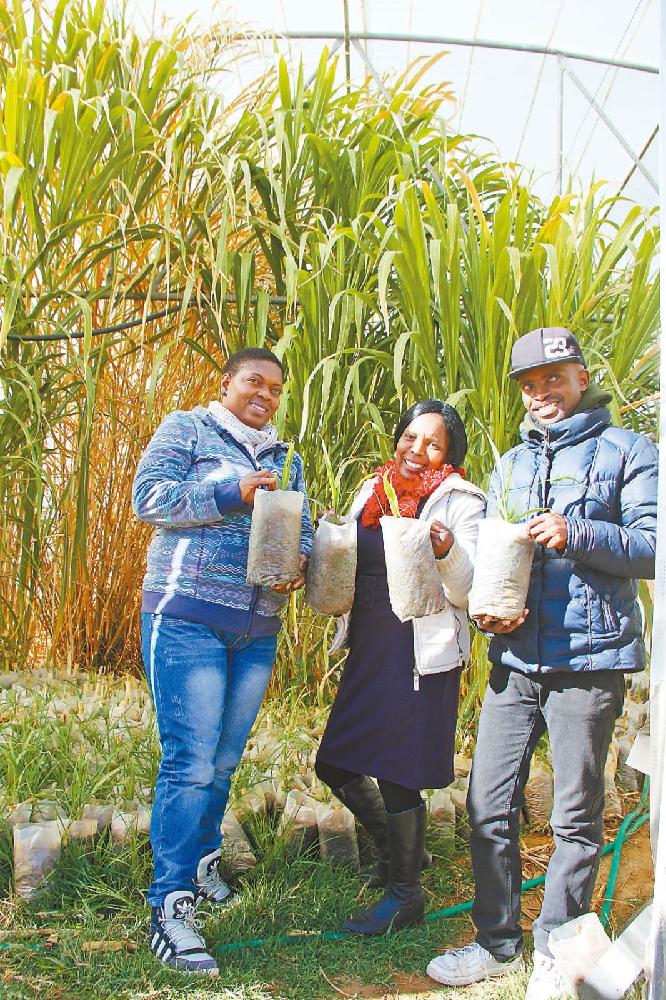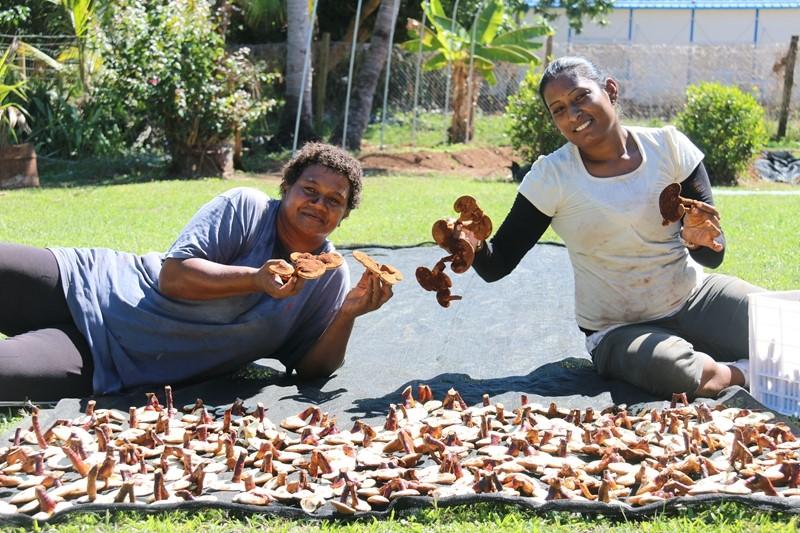At the recent 8th annual Multi-stakeholder Forum on Science, Technology and Innovation for the Sustainable Development Goals, a farmer named Freda Korarome from Papua New Guinea (PNG) shared her story of fighting poverty with assistance from technology.
From the deep mountains in PNG's Eastern Highlands to the UN headquarters in New York, she told her amazing journey with the Juncao technology to the world, a wonderful experience she could not imagine before.
Farmers learning the growing techniques of oyster mushrooms pose for a picture in front of a Juncao greenhouse in the suburbs of Maseru, capital of Lesotho. (People's Daily/Wan Yu)
Juncao, which literally means "mushroom" and "grass" in Chinese, can be used, as its name suggests, to grow edible mushrooms as livestock feed or as a green barrier to stop desertification. It is hailed by many as "magic grass."
As a female representative of the beneficiaries of the Juncao project of the China-UN Peace and Development Trust Fund, Korarome was the first Juncao grower to deliver a speech at the UN headquarters.
She said in the speech that after receiving technical training and guidance from Chinese Juncao experts, she employed 25 people in her village to grow Juncao, most of whom were females. Every week, she would sell 200 kilograms of fresh mushrooms to local dealers. Soon she earned money, with which she built a new house and bought a new car for her family.
The woman, in cooperation with Chinese experts, has offered training sessions for more than 1,500 people in 10 surrounding villages. The Juncao technology has increased local farmers' income, and lowered the rate of malnutrition in the community from 70 percent to 55 percent, she noted.
Her story has inspired people around. According to Korarome, people call her every day to congratulate her success and to learn the Juncao technology.
The Juncao technology marks a successful practice of China in promoting poverty alleviation, as well as an important contribution made by the country to the sustainable development of the world.
Juncao is a sound substitute for timber to be used as a substrate for growing edible mushrooms. It has solved the problem troubling the world that to produce edible mushrooms, trees must be cut down. So far, the technology has been applied in over 100 countries.
I serve as the deputy director of the China National Engineering Research Center of Juncao Technology. Over the past more than 20 years, I have met many women like Korarome.
After learning the Juncao technology, they became entrepreneurs and sci-tech workers. I see from them the strong aspiration of women in developing countries to eliminate poverty and embrace happiness, as well as the important role played by the Juncao technology in increasing the well-being of people, especially in improving the living environment for women.
Fiji farmers joining a Juncao technical training program held by China show mushrooms they have grown. (Photo from the official website of the China International Development Cooperation Agency)
I first realized that the Juncao technology could be life-changing for impoverished women when I worked in KwaZulu-Natal Province, South Africa in 2005.
In the province, there were many single mothers and grandmothers. They were poor in land and education, living on a meager income from government jobs.
A Chinese idiom goes that giving a man a fish feeds him for a day, but teaching a man fishing feeds him for a lifetime. After learning the Juncao technology, these women saw their income increase. They could afford their children's schooling, opened groceries in villages and even started a logistics business, which completely changed the lives of themselves and their families.
The UN 2030 Agenda for Sustainable Development includes 17 sustainable development goals, and the Juncao technology serves 13 of them including gender equality. In many developing countries, the technology can not only lift women's social status, but also serve as a demonstration that helps improve local productivity and economic vitality.
Under the guidance of Chinese experts, some women in Fiji, especially those with disabilities, have embraced a better life by growing Juncao. Among the nearly 2,000 people trained by the China-aided Juncao demonstration center in Fiji, women and people with disabilities account for 56.7 percent and 4.8 percent, respectively.
Arailde Fontes Urben, professor with the Brazilian Agricultural Research Corporation, has contributed to the promotion of the Juncao technology in South America.
Since she joined a training program on the Juncao technology in China in 1995, she has always been committed to the research and communication of the technology in South America. The expert, who is now in her 70s, has trained more than 2,000 people and translated a Chinese Juncao textbook into Portuguese, which was published in Brazil.
Developing the Juncao technology would benefit the whole mankind. China's Juncao has blazed a trail of sustainable development for the world.
It is believed that more and more women, who are indispensable for developing the industry, will realize their dreams with the Juncao technology.

